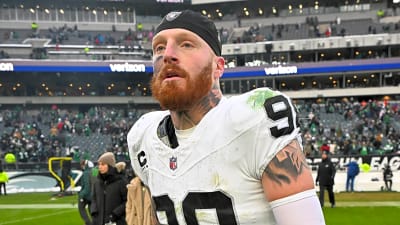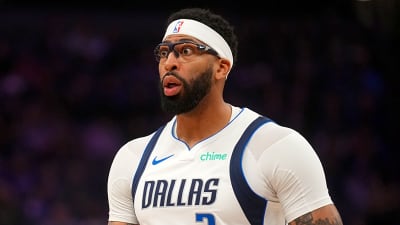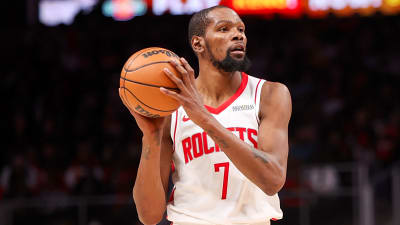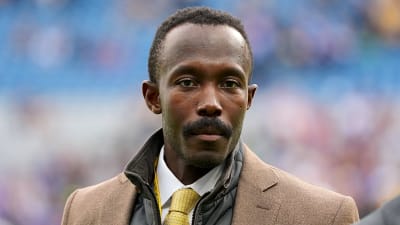- Home
- Quizzes
- My Quiz Activity
- Newsletters
- MY FAVORITES
- Add Sports/Teams
- SPORTS
-
NFL
- NFL Home
- Arizona Cardinals
- Atlanta Falcons
- Baltimore Ravens
- Buffalo Bills
- Carolina Panthers
- Chicago Bears
- Cincinnati Bengals
- Cleveland Browns
- Dallas Cowboys
- Denver Broncos
- Detroit Lions
- Green Bay Packers
- Houston Texans
- Indianapolis Colts
- Jacksonville Jaguars
- Kansas City Chiefs
- Las Vegas Raiders
- Los Angeles Chargers
- Los Angeles Rams
- Miami Dolphins
- Minnesota Vikings
- New England Patriots
- New Orleans Saints
- New York Jets
- New York Giants
- Philadelphia Eagles
- Pittsburgh Steelers
- San Francisco 49ers
- Seattle Seahawks
- Tampa Bay Buccaneers
- Tennessee Titans
- Washington Commanders
-
MLB
- MLB Home
- Athletics
- Arizona Diamondbacks
- Atlanta Braves
- Baltimore Orioles
- Boston Red Sox
- Chicago White Sox
- Chicago Cubs
- Cincinnati Reds
- Cleveland Guardians
- Colorado Rockies
- Detroit Tigers
- Houston Astros
- Kansas City Royals
- Los Angeles Angels
- Los Angeles Dodgers
- Miami Marlins
- Milwaukee Brewers
- Minnesota Twins
- New York Yankees
- New York Mets
- Philadelphia Phillies
- Pittsburgh Pirates
- San Diego Padres
- San Francisco Giants
- Seattle Mariners
- St. Louis Cardinals
- Tampa Bay Rays
- Texas Rangers
- Toronto Blue Jays
- Washington Nationals
-
NBA
- NBA Home
- Atlanta Hawks
- Boston Celtics
- Brooklyn Nets
- Charlotte Hornets
- Chicago Bulls
- Cleveland Cavaliers
- Dallas Mavericks
- Denver Nuggets
- Detroit Pistons
- Golden State Warriors
- Houston Rockets
- Indiana Pacers
- Los Angeles Clippers
- Los Angeles Lakers
- Memphis Grizzlies
- Miami Heat
- Milwaukee Bucks
- Minnesota Timberwolves
- New Orleans Pelicans
- New York Knicks
- Oklahoma City Thunder
- Orlando Magic
- Philadelphia 76ers
- Phoenix Suns
- Portland Trail Blazers
- Sacramento Kings
- San Antonio Spurs
- Toronto Raptors
- Utah Jazz
- Washington Wizards
-
NHL
- NHL Home
- Anaheim Ducks
- Boston Bruins
- Buffalo Sabres
- Calgary Flames
- Carolina Hurricanes
- Chicago Blackhawks
- Colorado Avalanche
- Columbus Blue Jackets
- Dallas Stars
- Detroit Red Wings
- Edmonton Oilers
- Florida Panthers
- Los Angeles Kings
- Minnesota Wild
- Montreal Canadiens
- Nashville Predators
- New Jersey Devils
- New York Islanders
- New York Rangers
- Ottawa Senators
- Philadelphia Flyers
- Pittsburgh Penguins
- San Jose Sharks
- Seattle Kraken
- St. Louis Blues
- Tampa Bay Lightning
- Toronto Maple Leafs
- Utah Mammoth
- Vancouver Canucks
- Vegas Golden Knights
- Washington Capitals
- Winnipeg Jets
- NCAAF
- NCAAM
- Olympics
- Boxing
- Entertainment
- Lifestyle
- Golf
- MMA
- Soccer
- Tennis
- Wrestling
- Sports Betting
- More Sports
- RESOURCES
- My Account
- YB on Facebook
- YB on Twitter
- YB on Flipboard
- Contact Us
- Privacy Policy
- Terms of Service
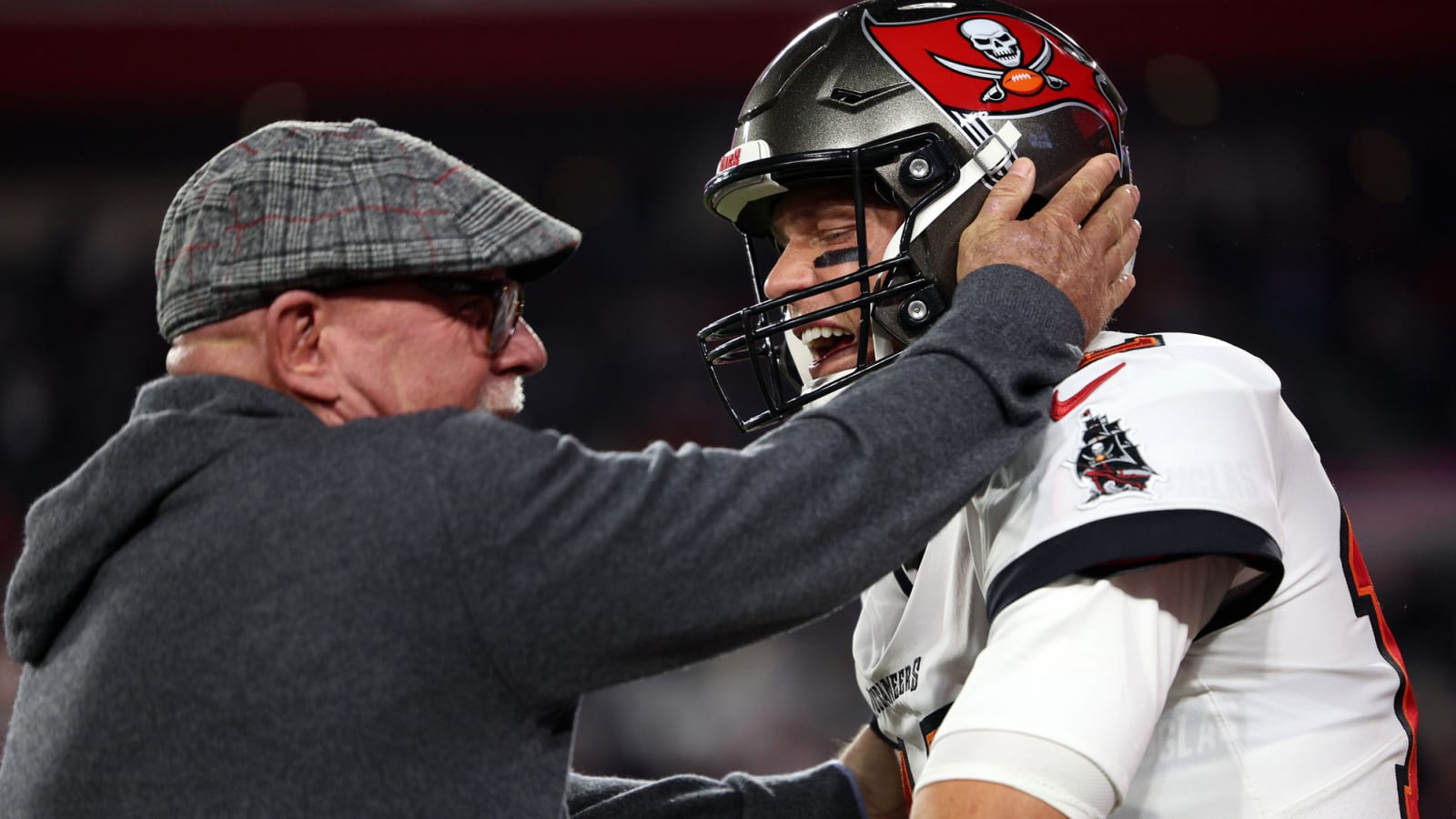
30 NFL teams that switched coaches after making the playoffs
While not especially common, a number of NFL teams have changed coaches after qualifying for the playoffs. From retirements to resignations to firings, here are the teams who have made post-playoff switches since the 1970 merger.
Tampa Bay Buccaneers, 2022

Bruce Arians remained in place as Buccaneers brass convened at the 2022 Scouting Combine and through the early days of free agency. Arians was still there to make decisions, indicating the Bucs would not trade the then-retired Tom Brady's rights to another team. Weeks later, with Brady back in the picture, everything changed. Arians has repeatedly denied Brady effectively forced him out, which led to the team elevating Todd Bowles and moving Byron Leftwich into the play-calling role. Arians' exit was noticeable. The Bucs, who went 12-5 in 2021, slogged through an 8-9 season filled with Brady-driven headlines. Arians remained with the Bucs in an unspecified advisory role.
Las Vegas Raiders, 2022
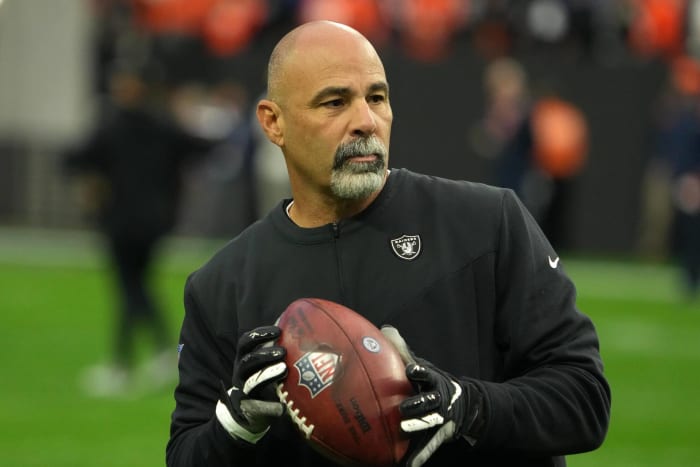
Mark Davis' regret over passing on Bisaccia -- the special teams coordinator elevated to replace Jon Gruden as interim HC in October 2021 -- played a role in the owner moving his latest interim leader (Antonio Pierce) to the full-time role. Rich Bisaccia, whom the Raiders passed on to hire Josh McDaniels, helped a Raiders team that saw first-rounders Henry Ruggs and Damon Arnette booted due to off-field incidents. The Raiders went 7-5 under Bisaccia, a 2018 Gruden hire as special teams coordinator, and advanced to the playoffs for the first time since 2016. Despite nearly upsetting the eventual AFC champion Bengals, the Raiders changed course. This led Bisaccia to Green Bay.
Tennessee Titans, 2018
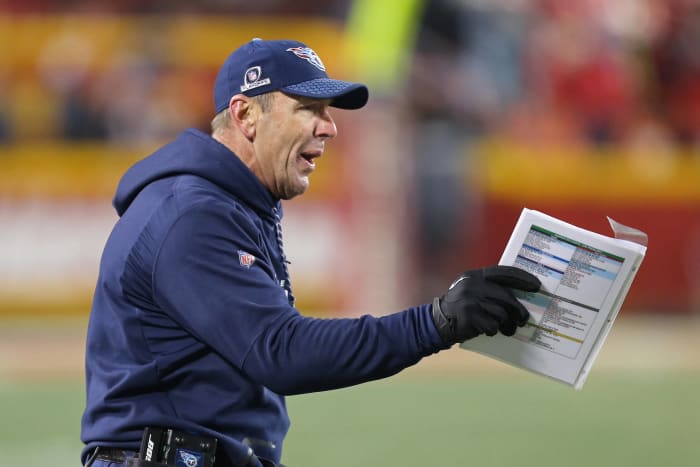
The Titans are the most recent team to fire a coach after he had overseen a playoff effort. An about-face occurred in January 2018. Following a 9-7 regular season, ownership gave Mike Mularkey assurances he would be back. The Titans then upset a shorthanded Chiefs team -- in Alex Smith's finale as Kansas City's starter -- in the wild-card round, the team's first playoff win since 2003. Tennessee lost in a one-sided divisional-round game in New England, and ownership pivoted and fired Mularkey not long after offering an extension. The Titans had elevated Mularkey from interim HC status in 2015 and only gave him two seasons; he went 9-7 each year. Mike Vrabel took over weeks later.
Denver Broncos, 2015

Rumblings connecting John Fox to the Bears' HC job surfaced before the Broncos' divisional-round matchup with the Colts. Fox had coached the Broncos to four straight playoff berths, initially signing off on an offense overhaul to account for Tim Tebow's limitations. The following three years featured Peyton Manning, whose towering presence overshadowed Fox. The Broncos lost two divisional-round home games in the Fox-Manning era, the first coming when Denver's defense allowed 38 points to the Ravens. The second was enough for GM John Elway. The Broncos moved on from Fox following a 24-13 loss to the Colts. Denver then won Super Bowl 50 under Gary Kubiak after Fox took the Chicago job.
Indianapolis Colts, 2009

Associated with a failure to lift the Buccaneers to the Super Bowl (after changing the franchise's fortunes in the 1990s), Tony Dungy boosted the Colts in the 2000s. Indianapolis set a then-record with seven straight 12-plus-win seasons (2003-09); six came under Dungy, who coached the '06 team to the Super Bowl XLI title. Dungy did so following his teenage son's death, which happened just before the 2005 playoffs. After the 2008 season -- which ended with an overtime loss to the 8-8 Chargers -- Dungy informed Jim Irsay he was retiring. This triggered the Colts' succession plan, which elevated QB coach Jim Caldwell. Indy advanced to Super Bowl XLIV the following season.
Washington, 2008
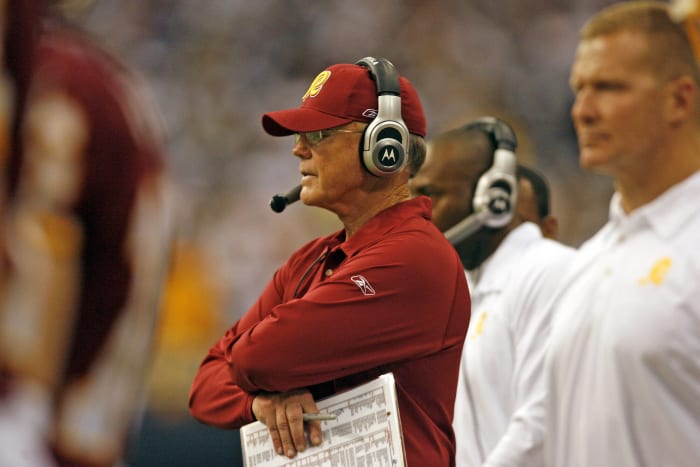
Joe Gibbs' 2004 return brought the best Washington stretch since ... Joe Gibbs' first retirement. After 11 seasons away, Gibbs returned and agreed to work for Dan Snyder. Using the likes of Mark Brunell, Jason Campbell and Todd Collins at quarterback, Washington advanced to two playoff brackets under Gibbs. The '05 team downed the Bucs in the wild-card round. Gibbs' '07 squad, which lost its QB1 (Campbell) late that season, could not upset the Seahawks. Gibbs' final retirement led to Seattle's QB coach, Jim Zorn, taking over. Zorn lasted two seasons, before Snyder convinced Mike Shanahan -- and an armada of promising assistants -- to sign up.
San Diego Chargers, 2007
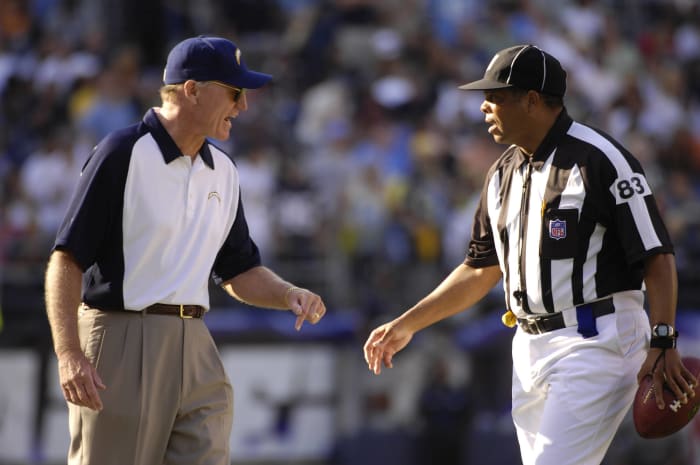
A power struggle severed the Chargers' relationship with Marty Schottenheimer. After the former Cleveland, Kansas City and Washington coach grew frustrated with GM A.J. Smith's decisions, disagreements on Schottenheimer's coaching staff emerged. The Chargers were set to lose both coordinators (Wade Phillips, Cam Cameron) to HC jobs and then two assistants to coordinator gigs. Smith had not hired Schottenheimer, returning to the Chargers as GM in 2003. Schottenheimer had rebuilt the Bolts, and their 2006 team finished a franchise-best 14-2. An upset loss to the Patriots dropped Schottenheimer's playoff record to 5-13. Dean Spanos ultimately sided with his GM, firing the successful coach and hiring Norv Turner.
Dallas Cowboys, 2007

Not known for long-term commitments following his lengthy Giants run, Bill Parcells matched his Patriots stint with the Cowboys. The four-year Dallas head coach had lifted a downtrodden team back to the playoff level, qualifying for two NFC brackets. Jerry Jones had given Parcells more power than he handed his other post-Jimmy Johnson leaders, and the Super Bowl-winning HC was coming off a narrow wild-card loss to the Seahawks -- which culminated with the Tony Romo hold mishap. Parcells decided four years was enough in his fourth and final coaching gig. The Cowboys then hired Wade Phillips from the Chargers.
San Francisco 49ers, 2003
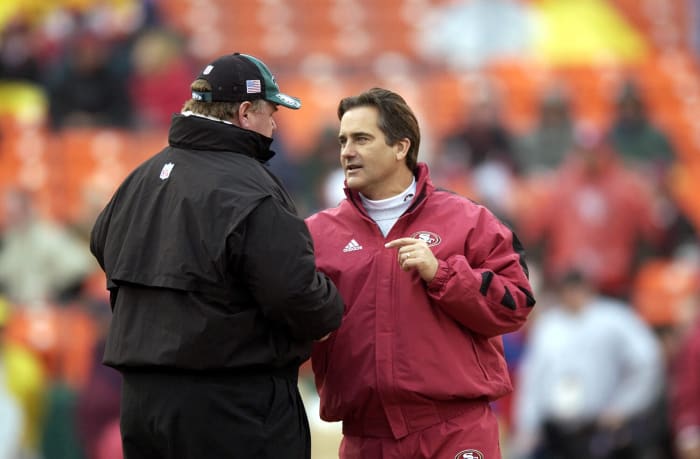
Steve Mariucci guided the 49ers to four playoff berths in six years, two of those journeys coming after Steve Young's retirement. The 49ers had completed a 24-point comeback win to stun the Giants in the wild-card round, before losing a one-sided Round 2 game against the Buccaneers. The relationship between Mariucci and owner Jed York had deteriorated, and Terry Donahue -- the 49ers' GM at the time -- said the head coach wanted more power within the organization. This firing looked to be a mistake. The 49ers quickly plummeted toward the NFL's basement, failing to make the playoffs again until Jim Harbaugh's 2011 arrival. Dennis Erickson replaced Mariucci; the future NFL Network mainstay resurfaced in Detroit.
Oakland Raiders, 2002
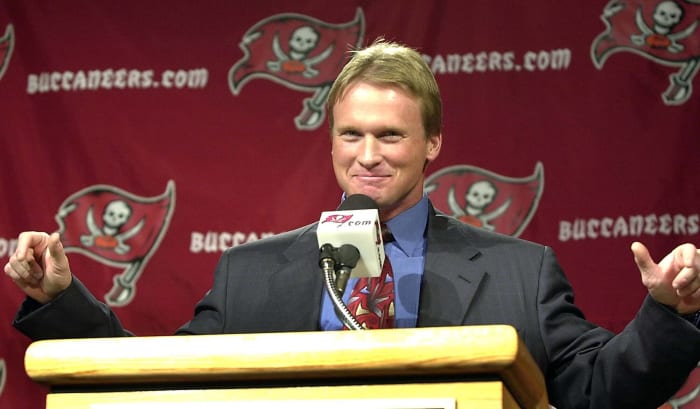
When the Buccaneers canned Tony Dungy, Bill Parcells was viewed as the team's target. But the organization's plans soon impacted the Raiders. Coming off a bitter loss in the "Tuck Rule" game, the Raiders lost their most successful coach in a generation. Rather than authorize a monster Jon Gruden extension, Al Davis asked the Bucs for multiple first-round picks and Warren Sapp. The Bucs reduced Davis' price, prying Gruden from Oakland for two first-rounders, two seconds and $8 million. This did not exactly derail the Raiders in 2002. They promoted OC Bill Callahan, and the team's veteran nucleus rolled to Super Bowl XXXVII. Gruden was quite familiar with his Super Bowl opponent, and the blowout loss sent the Raiders into a tailspin.
Tampa Bay Buccaneers, 2002

Prior to the seminal Gruden trade, the Bucs determined Tony Dungy had not coaxed enough from his roster. After losing a low-scoring 1999 NFC championship game in St. Louis, Tampa Bay went down in Philadelphia in back-to-back years. The 2001 Bucs went 9-7, and ownership eyed Parcells, who had spent the past two seasons out of football. The Bucs also considered a trade for 49ers HC Steve Mariucci but circled back to Gruden, who signed a five-year contract following the trade. Dungy had resurrected the Bucs, turning a doormat into a playoff team in his second season. Gruden won with the team Dungy and GM Rich McKay built but could not sustain success over his final six seasons with the team.
St. Louis Rams, 2000

Dıck Vermeil retired for a second time, doing so after a better season this time around. Nearly 20 years after he left the Eagles, citing burnout, Vermeil walked away again following the Rams' Super Bowl XXXIV win. After struggling to assemble a competitive St. Louis outfit in his first two years, Vermeil struck gold thanks to a few 1999 roster updates. The trade for Marshall Faulk and first-round selection of Torry Holt set up Trent Green, but a preseason injury changed NFL history. Signed late in 1998, Kurt Warner dominated in his first starter season. Warner stayed on pace with new coach Mike Martz, the Rams' 1999 play-caller. The Chiefs sent the Rams second- and third-round picks for Vermeil's rights in 2001.
Miami Dolphins, 2000
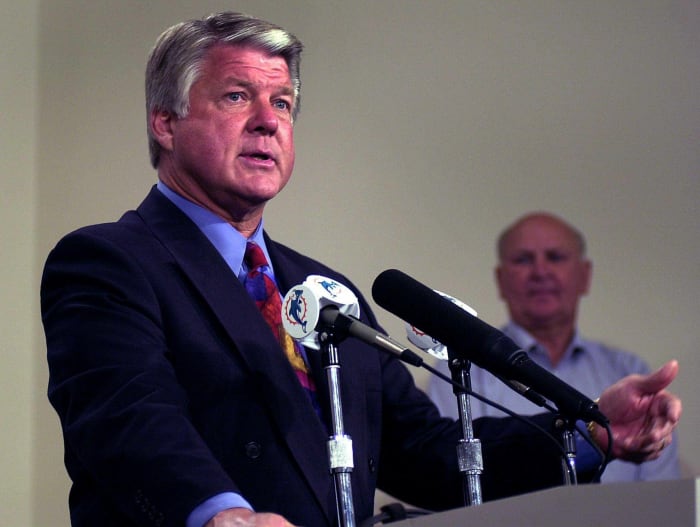
Ownership talked Jimmy Johnson into coming back for the 1999 season, and the Dolphins remained a factor in the AFC. But Johnson could not elevate the team past a fringe Super Bowl contender. In Johnson's five seasons, the Dolphins did not sport a losing record but won 10 games just once. This season would double as Dan Marino's walk-off as well. Marino and Johnson pulled out a wild-card win in Seattle but endured a rough exit, seeing a 62-7 Jaguars rout end their careers. Johnson, who handed the keys to Dave Wannstedt -- his defensive coordinator in Dallas and Miami -- and has stayed retired. Wannstedt guided Miami to the 2000 divisional round.
Dallas Cowboys, 2000

Hired after four seasons as a Steelers assistant, Chan Gailey is the shortest-tenured coach in the Jerry Jones era. The Cowboys hired Gailey in 1998, and the offense-oriented leader booked two playoff berths. But Gailey caught a team in decline and one that battled injuries, most notably Michael Irvin's October 1999 career-ender. The Cowboys went one-and-done in each season, losing wild-card games to the Cardinals and Vikings. Jones fired Gailey, and the Cowboys' fortunes worsened to start the 21st century. They promoted defensive coordinator Dave Campo, who was easily the worst HC in the owner's run. Campo was given three seasons, going 5-11 in each.
Green Bay Packers, 1999

Mike Holmgren exit rumors brewed as far back as Super Bowl XXXII. They stemmed from personnel power. The Seahawks loomed as being ready to offer Holmgren GM power, and Packers GM Ron Wolf -- a future Hall of Famer who called the shots in Green Bay -- had said he would not block his seven-year HC from leaving for such a chance. The Packers had revised Holmgren's contract, allowing him to leave if a team offered him an HC-GM role. The adjusted deal mandated the Packers receive a second-round pick for Holmgren. The then-AFC West-stationed Seahawks extended that offer in 1999, making Holmgren the NFL's highest-paid coach. The Packers replaced their Super Bowl-winning HC with Ray Rhodes, whom they fired after one season.
New England Patriots, 1997
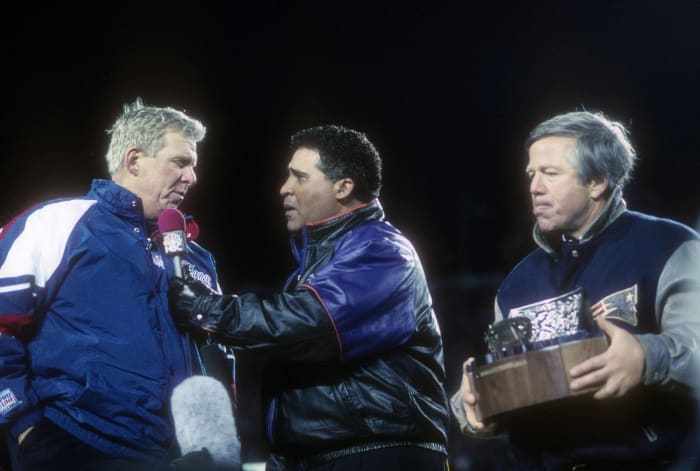
The four-year Parcells-Robert Kraft partnership began to crumble as the Patriots journeyed to Super Bowl XXXI. Parcells famously lamented not being able to "shop for the groceries" with the Patriots, and this situation came to a head after he left the team shortly after a Super Bowl loss to the Packers. This turned into a Patriots-Jets duel, with Parcells in limbo while the sides negotiated compensation. (Bill Belichick, in the meantime, served as acting Jets HC.) Commissioner Paul Tagliabue brokered a deal, giving the Jets Parcells in exchange for first-, second-, third- and fourth-round picks (spread from 1997-99). Parcells lasted three years with the Jets, matching Pete Carroll's run with the Pats.
San Francisco 49ers, 1997

George Seifert won two Super Bowls as 49ers head coach, both blowout romps. In the years following Super Bowl XXIX, the 49ers endured divisional-round eliminations at the rising Packers' hands. The eventual champions ousted a 49ers team that lost Steve Young during the muddy matchup, and GM Carmen Policy informed Seifert his contract -- which ran through the 1997 season -- would not be renewed. Not keen on moving through a lame-duck season, Seifert resigned after his eighth season. The 49ers hired California coach Steve Mariucci as their replacement. After two years off, Seifert caught on with the Panthers in 1999.
Miami Dolphins, 1996
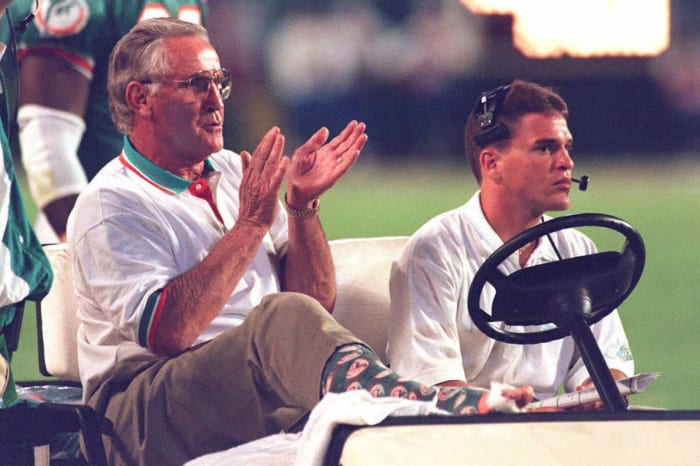
Although Don Shula is revered and remains the NFL's winningest coach nearly 30 years after his retirement, some pressure mounted due to the team going more than 20 years without a Super Bowl title. Shula's aggressive 1995 offseason produced a hot start but ended with a 9-7 record and a one-sided wild-card loss to the Bills. Shula had recovered from a late-'80s dry spell, taking Miami to the playoffs in four of his final six seasons. But the team appeared in one conference title game -- another one-sided loss to the Bills -- after Dan Marino's explosive sophomore season. The Dolphins hired Jimmy Johnson, bringing the ex-Hurricanes maestro back to Miami.
Washington, 1993

The exception when it comes to coaches who made themselves regulars in Super Bowls, Joe Gibbs famously won titles with three different quarterbacks. Finding replacements for Joe Theismann and Doug Williams, Gibbs delivered his best Washington team with Mark Rypien at the helm. A year after the 1991 squad's coronation, Gibbs walked away. The 12-year Washington HC/offensive guru, initially citing medical issues, made a transition to running a successful NASCAR team. Gibbs did not leave his post until March, leading to longtime defensive coordinator Richie Petitbon taking over. An aging '93 Washington team went 4-12, and Petitbon became a one-and-done.
New York Giants, 1991
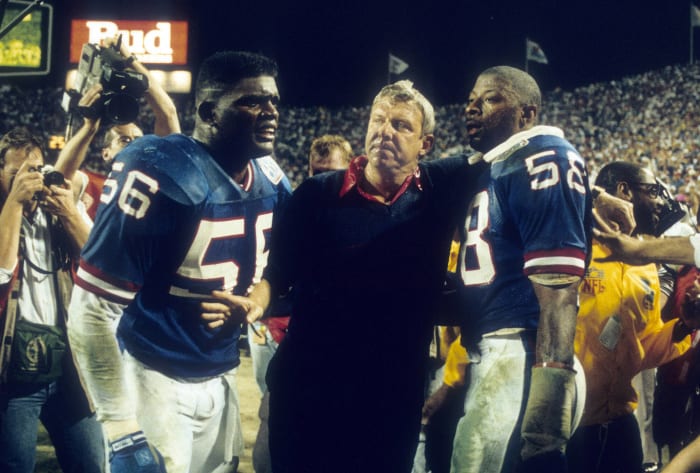
In a four-month span, the Giants lost two Hall of Fame coaches. Following Super Bowl XXV, defensive coordinator Bill Belichick became the Browns head coach. In May, Bill Parcells stunningly resigned. Parcells did not indicate a health problem at the time, but it was later revealed he was dealing with a heart condition. This brain drain came shortly after the Giants ended the 49ers' threepeat bid and toppled the favored Bills in the Super Bowl. It would be a while before the team reached this level again. GM George Young was unlikely to promote Belichick even had he stuck around. Instead, overmatched assistant Ray Handley took over. He was out after two non-playoff seasons.
Philadelphia Eagles, 1991
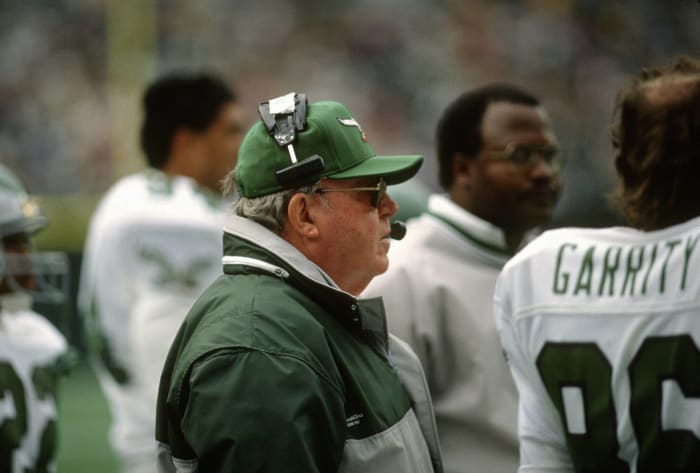
For all Buddy Ryan's detractors, the brash defensive guru turned around the Eagles on the heels of his Super Bowl XX win as Bears defensive coordinator. The Eagles advanced to three straight playoff brackets but lost as a wild-card host in 1989 and '90. Citing a desire to ditch a habit of early-round losses and move away from the bad-boy reputation the Eagles earned under Ryan, ownership fired him and gave the job to offensive coordinator Rich Kotite. Ryan's benching Randall Cunningham in the '90 wild-card loss also did not go over well in the building. The Eagles won a playoff game under Kotite, but Washington and Dallas outflanked them, winning three combined Super Bowls during his time in Philly.
Houston Oilers, 1990
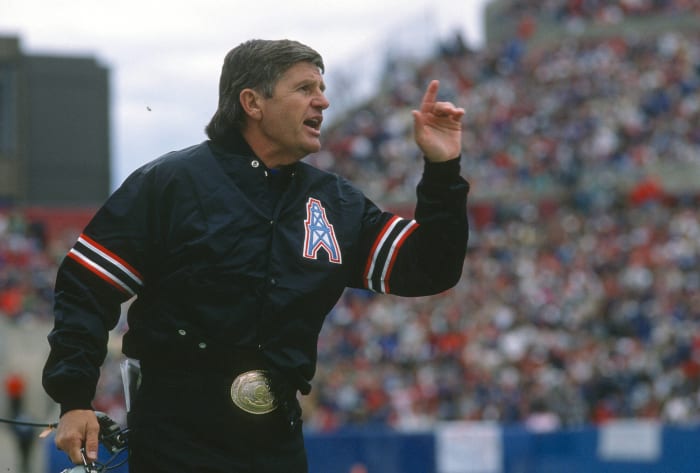
Jerry Glanville presided over an Oilers turnaround in the late 1980s; the team ventured to three consecutive playoff fields and won two games. The colorful coach's personality turned off many, and the Oilers' penchant for dirty tactics did not endear him to many around the NFL. Glanville and owner Bud Adams decided to split after the 1989 season, a 9-7 campaign. Houston's season ended with three straight Oiler losses -- one of them a 61-7 demolition that featured Cincinnati coach Sam Wyche running up the score on a heated rival. Glanville's eccentricities made for a fun fit in Atlanta, where he landed soon after. The Oilers hired Houston Cougars coach Jack Pardee, greenlighting a Run and Shoot commitment.
San Francisco 49ers, 1989

Bill Walsh did not land his shot as an NFL head coach until he was 47, shortening his timetable for what would be an important run in San Francisco. The revolutionary offensive coach galvanized a dynasty, but by Year 10 in that job, the innovator ran into burnout. Making a decision to walk away midway through an inconsistent 1988 season, Walsh later expressed regret he left when he did. The 10-6 49ers caught fire late, routing the Vikings and Bears in the playoffs before Joe Montana's storied 92-yard game-winning drive downed the Bengals. The 49ers managed to roll out arguably the NFL's greatest team in 1989, with George Seifert keeping a Walsh-designed sportscar on the road en route to a repeat title.
Cleveland Browns, 1989

Two Bernie Kosar injuries limited the Browns in 1988, a season they entered as AFC favorites. As they did in 2023, the Browns advanced to the playoffs despite starting four QBs. While Kevin Stefanski picked up Coach of the Year honors, Marty Schottenheimer was sent packing. Cleveland went 10-6, losing to Houston in the wild-card round with Kosar injured. Schottenheimer's refusal to hire an offensive coordinator to replace Lindy Infante, who became the Packers' HC in 1988, rankled Art Modell. The coach did not back down on staffing in 1989, leading to this divorce. Schottenheimer led the Browns to four straight playoff berths; successor Bud Carson was out midway through his second season.
Kansas City Chiefs, 1987
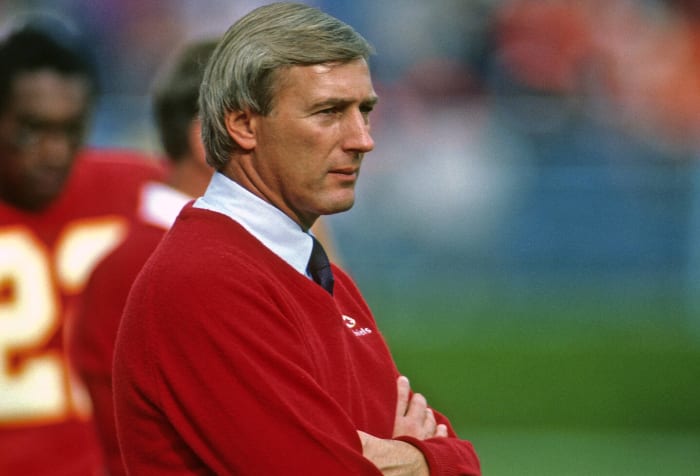
The Chiefs' only playoff berth between 1971 and 1990 came under John Mackovic, who guided the team to a 10-6 record in 1986. The Chiefs made it to the postseason despite drawing the short straw in the famous 1983 QB class, selecting the least effective first-rounder (Todd Blackledge). This firing may have been more about Mackovic's staff. The Chiefs had offered their fourth-year HC a two-year extension in early January, shortly after a wild-card loss to the Jets. After news of defensive coordinator Walt Corey's move to become Buffalo's DC and special teams coordinator Frank Gansz resigning, ownership opted to can Mackovic. The Chiefs circled back to the popular Gansz, who went 8-22-1 in two seasons.
New York Jets, 1983

Walt Michaels orchestrated a Jets turnaround in the early 1980s, leading them to back-to-back playoff berths and the 1982 AFC championship game. Tension between Michaels and team president Jim Kensil existed, and the coach's temper may have bothered ownership. The Dolphins shut out the Jets' third-ranked offense in the 1982 AFC decider, and Michaels expressed issues with the hosts' management of their waterlogged field. After no-showing an end-of-season meeting, Michaels announced his resignation. A Jets coordinator for 11 years (two stints) prior to a six-season HC run, Michaels resurfaced in the USFL (as the New Jersey Generals' HC) in 1984. OC Joe Walton took the Jets' coaching reins, lasting seven years.
Houston Oilers, 1981
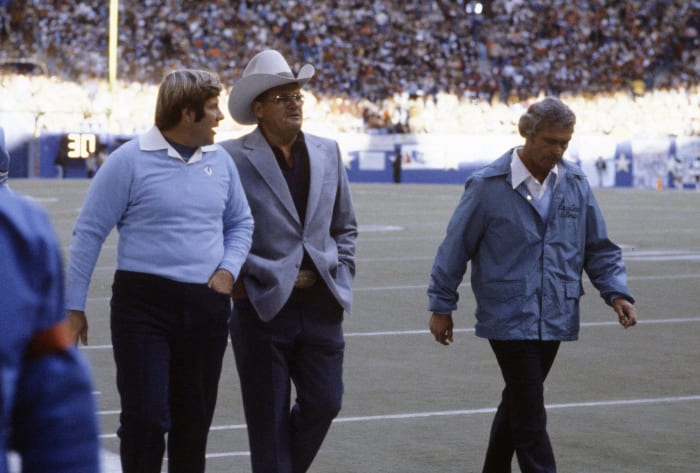
After back-to-back AFC championship game losses in Pittsburgh, the Oilers made a bold move by making a quarterback-for-quarterback trade. They shipped starter Dan Pastorini to the Raiders for Ken Stabler. Neither team benefited. Stabler posted a 13-28 TD-INT ratio in 1980, and The Snake's old team ended the Oilers' season with a wild-card rout. Owner Bud Adams wanted coach Bum Phillips to hire an offensive coordinator, as the team slipped to 20th on offense. The disagreement led to Phillips' ouster after six years. Defensive coordinator Ed Biles took over, being fired during his third season. Phillips landed with the Saints, coaching the then-NFC West team for five years.
New England Patriots, 1979

Chuck Fairbanks had revitalized the Patriots, guiding them to playoff berths in 1976 and '78. The latter effort, which produced an 11-5 record and the NFL's single-season team rushing standard that stood until the 2019 Ravens eclipsed it, involved a wayward conclusion. A former Oklahoma coach, Fairbanks reached a deal to leave the Patriots for the Colorado HC job late in the 1978 season. This led to Fairbanks' exile before the Pats' regular-season finale. However, team legal action brought him back for an awkward divisional-round game -- a one-sided loss to the Oilers. The AFC East champs, who had used a co-interim coach setup in Week 16, promoted OC Ron Erhardt in 1979.
Los Angeles Rams, 1978
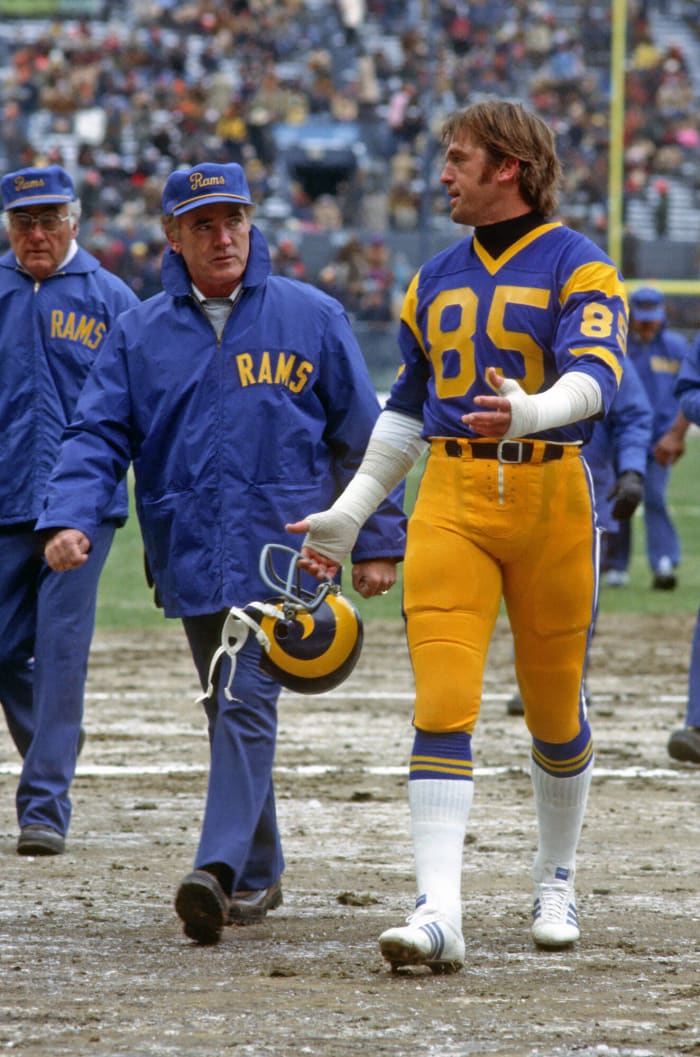
Known for quality regular seasons and playoff letdowns under Chuck Knox, the Rams backtracked on an extension agreement following the 1977 season. Owner Carroll Rosenbloom let his five-year coach speak with other teams after a Rams divisional-round loss to a Fran Tarkenton-less Vikings team. Framed as Knox leaving for a Bills deal, Rams ownership was not exactly crestfallen to lose him. Rosenbloom called Knox's offenses dull; the team could not settle on a QB during a period in which Tarkenton and Roger Staubach ruled the NFC. The Rams brought back George Allen, only to fire him after a player mutiny during training camp. Knox's DC, Ray Malavasi, took over and led Los Angeles to Super Bowl XIV in his second year.
Chicago Bears, 1978
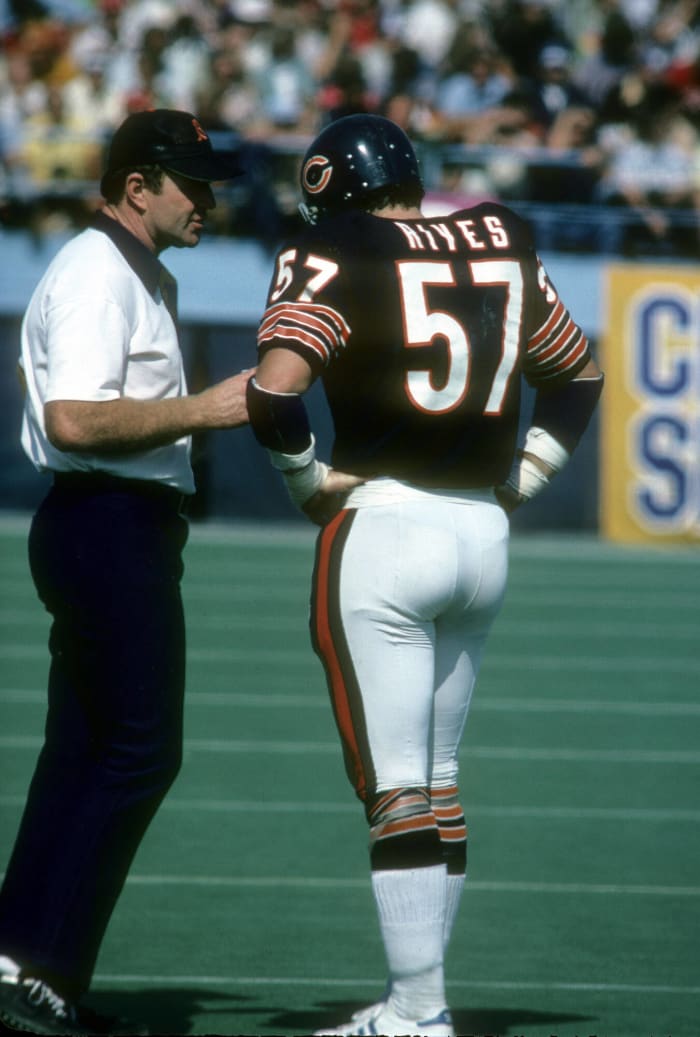
A Cinderella story of sorts transpired during the 1977 season in Chicago. Walter Payton won MVP honors, carrying the Bears to a 9-5 record and their first playoff berth since the 1963 NFL title game. Jack Pardee's third season as Bears head coach involved a Payton-dependent team, but he had it going in the right direction. GM Jim Finks offered Pardee an extension, but he resigned, eyeing the Washington HC post. A former Washington linebacker, Pardee landed on his feet in D.C. Pardee later cited Bears instability and low-end facilities for the pivot. The Bears hired Vikings assistant Neill Armstrong. An ownership change preceded Pardee being booted from Washington after four years.
Sam Robinson is a sportswriter from Kansas City, Missouri. He primarily covers the NFL for Yardbarker. Moving from wildly injury-prone sprinter in the aughts to reporter in the 2010s, Sam set up camp in three time zones covering everything from high school water polo to Division II national championship games
More must-reads:
- CeeDee Lamb sends message to Cowboys about George Pickens
- What Raiders reportedly may want in Maxx Crosby trade amid renewed Patriots rumors
- The 'Super Bowl XLIX starters' quiz
Breaking News
Trending News
Customize Your Newsletter
 +
+
Get the latest news and rumors, customized to your favorite sports and teams. Emailed daily. Always free!
PRIVACY POLICY EDITORIAL POLICY CONTACT US
ABOUT YARDBARKER TERMS OF SERVICE
Use of this website (including any and all parts and
components) constitutes your acceptance of these
Terms of Service and Privacy Policy.
This site is for entertainment purposes only.
There is no gambling offered on this site.
Gambling Problem? Call 1-800-Gambler.
